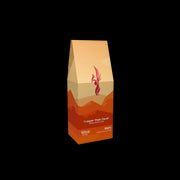Technically, no one “invented” coffee. It was nature that created the coffee plant (Coffea), and it has been enjoyed for centuries in different forms. What we think of as "coffee" today—the roasted, brewed beverage—was developed and perfected by different cultures across time, from the Ethiopian highlands to Yemeni monks, European traders, and Brazilian farmers.
The Legendary Goat Herder: Kaldi’s Discovery
The most popular story of coffee’s origins dates back to 9th-century Ethiopia. The legend goes like this: a goat herder named Kaldi noticed that his goats became unusually energetic after eating red berries from a certain tree. Curious, Kaldi tried the berries himself and experienced a similar boost of energy. He brought the berries to a local monk, who, fearing the strange fruit, tossed them into the fire. But then, something magical happened—the scent of roasting coffee filled the air.
Intrigued, the monks retrieved the roasted beans, ground them, and mixed them with water, thus creating the first cup of coffee. The monks quickly realized the brew helped them stay awake during long hours of prayer. From there, the secret of coffee began to spread.
While this story makes for a good story, it’s more folklore than historical fact.
The Arabian Connection: Coffee Travels to the Middle East
From Ethiopia, coffee made its way across the Red Sea to the Arabian Peninsula. By the 15th century, coffee was being cultivated in Yemen. The Sufi monks of Yemen were particularly fond of coffee because it helped them stay awake during long religious ceremonies—just like the monks in Kaldi's story.
It was in Yemen that coffee truly began to take off. The Yemeni city of Mocha (yes, like your favorite chocolatey coffee drink) became a key port for the coffee trade. Coffeehouses, known as qahveh khaneh, popped up all over the Middle East, especially in Mecca and Cairo, becoming centers of socialization and intellectual exchange.
Enter Europe: Coffee Takes the Continent by Storm
By the 17th century, coffee had made its way to Europe. It arrived first in Venice, brought by traders who encountered it in the Ottoman Empire. Initially, coffee was met with suspicion in Europe, sometimes even being referred to as the “bitter invention of Satan.” However, Pope Clement VIII is said to have given it his blessing, reportedly remarking, "This Satan’s drink is so delicious that it would be a pity to let the infidels have exclusive use of it."
With papal approval, coffeehouses began opening all over Europe. By the late 1600s, cities like Vienna, London, and Paris were buzzing with coffee culture. These early coffeehouses became known as “penny universities” because for the price of a penny, you could not only get a cup of coffee but also engage in stimulating conversations with poets, philosophers, and scholars.
The Birth of Coffee as a Global Commodity
Coffee’s journey didn’t stop in Europe. In the 17th and 18th centuries, European colonists and traders brought coffee plants to Java (Indonesia), the Caribbean, South America, and India. The Dutch were the first to successfully cultivate coffee outside of Arabia, establishing plantations in Java. This is why coffee from Indonesia is still known as “Java” today.
In Brazil, coffee cultivation exploded, and by the 19th century, Brazil had become the largest producer of coffee in the world—a title it still holds today. The rise of coffee plantations also had darker consequences, particularly in the Americas, where they were fueled by the transatlantic slave trade.









